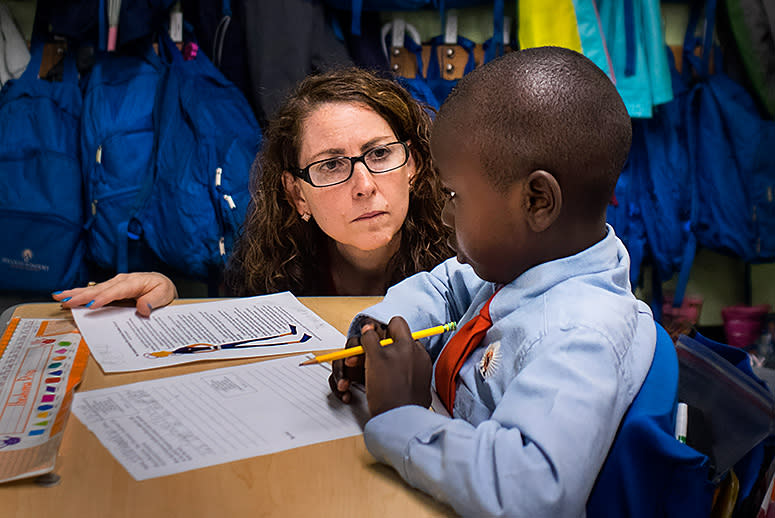Boot Camp or School? Critics Worry Charters for Minority Kids Are Too Militant
Their controversial methods sound like a cross between Harvard and a Marine Corps boot camp: strict dress and posture code, high (and rigid) expectations, public shaming of underachievers, zero tolerance for shenanigans.
In the no-excuses culture of some charter schools, it’s common for administrators to wave good-bye to teachers who can’t hack it and heap praise on a student who wet himself rather than take a bathroom break at test time.
There’s no arguing, however, with the results of the aptly named Success Academy, a New York City–based chain of charter schools that’s known for academic achievement as much as militaristic discipline. Student test scores are strong—Success students are typically among New York state’s top performers—and each year parents scramble to enter a long-odds lottery just for a chance to enroll their kids.
Yet critics say Success—and other tough-love charter schools, such as Chicago’s Noble Street chain—are sacrificing education, and students’ love of true learning, on the altar of a misguided,teach-to-the-test culture.
For all its achievement, Success’ pressurized environment has led to one of the higher rates of student suspension and expulsion in New York, along with a teacher turnover rate that’s all but put a revolving door on the faculty lounge.
“It’s really quite high” compared with traditional public schools, says Pauline Lipman, a University of Illinois–Chicago educational policies professor and an expert on urban education and inequality. The tough standards and hyper-focus on test scores, she says, typically don’t leave room for creativity, independent thought, or individualized education—it prepares kids to take tests instead of preparing them for college.
“They basically drill kids in a good portion of the year. And when kids don’t [achieve], then they are shamed,” says Lipman. That approach, she says, teaches kids that “it’s their own fault because they aren’t putting forth the effort.”
That’s true at Success Academy: Low-scoring students are sent to “effort academies,” whichThe New York Times recently described as part detention, part study hall. At the same time, Success and other no-excuses charter schools have suspension and expulsion rates up to six times higher than traditional public schools, and they’ve been accused of pushing out students with learning or emotional disabilities.
There’s another problem with the approach: “I think it’s grounded in race,” Lipman says. “It sees poor [minority] families as pathological” and assumes they’re poor because they aren’t working hard enough.
The student populations at no-excuses charters “are almost entirely black and Latino,” says Lipman, and the schools are located in poor communities with failing traditional public schools. Those charters, she adds, convince parents—and school administrators—that tough love is the answer rather than giving chaotic, underachieving, understaffed, and overwhelmed neighborhood schools the resources they need to succeed.
But one parent says critics of Success Academy are painting things with a broad brush. Ariela Rozman, whose son attends a Success Academy school in New York City, says he is thriving, eager to learn, and can’t wait for classes to start in the morning.
“I can’t help but feel that there is an implicit assumption in education debates that parents whose children are primarily served by charter schools like Success—who tend to be low-income students of color—aren’t capable of making those choices or have somehow been duped into buying into these schools’ philosophies,” she wrote in an essay in The Huffington Post published on Thursday.
“That’s deeply biased and flat-out wrong,” Rozman continued. “I think we can safely say that the thousands of parents who descended on Albany recently, advocating for their children’s right to stay in Success Academies, or the parents of the 20,000-plus children who enter the lottery for spots in Success Academy schools each year haven’t been hoodwinked.”
“They’re making real, informed choices—just like I do,” wrote Rozman, “about what they want for their kids.”

Related stories on TakePart:
Original article from TakePart

